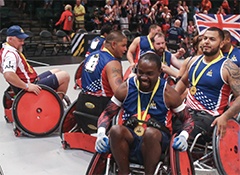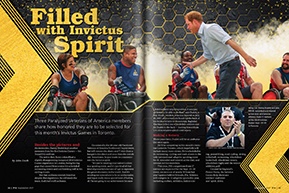Three Paralyzed Veterans of America members share how honored they are to be selected for this month’s Invictus Games in Toronto
By John Groth
Besides the pictures and the memories, Danny Dudek kept another memento from his first Invictus Games — his Team USA uniform. The active duty Army colonel had a slightly disappointing inaugural 2014 Invictus Games experience in London, losing his luggage that caused him to miss his scheduled swimming events and not finishing well in his cycling events. But that uniform reminds him that despite that experience, he still made the team. And that’s still an honor.
Occasionally, the 48-year-old Paralyzed Veterans of America Northwest Chapter member will remove the shorts and T-shirt from a hanger in his closet and wear them for a workout. Sometimes, he just wants to commemorate the Invictus spirit.
“It’s you’re wearing your nation’s colors to a sporting event, and it’s just kind of that kind of powerful overture of I get to represent the greatest country in the world. And it’s sending me somewhere to be an ambassador, and it just really was a special kind of feeling of, I’m not going to say achievement because I didn’t achieve anything with it, it was just an honor to be able to do that,” says Dudek, a Roy, Wash., resident, who was injured on July 19, 2007, after a roadside bomb hit the back of his Stryker vehicle in Husseiniya, Baghdad. The blast killed one of his fellow soldiers and hit Dudek in the back — leaving him with an L3-L4 incomplete spinal-cord injury.
Making A Return
Three years later, Dudek will be an ambassador once again. He’ll be competing in this month’s Invictus Games in Toronto, which hopefully will include many more events. He’s scheduled to do swimming, cycling and track events in the only international adaptive sporting event for ill, wounded and injured active duty and veteran service members. This year, 550 competitors from 17 nations are expected for the Sept. 23–30 event, an increase of nearly 50 from last year’s games held in Orlando, Fla. Athletes will compete in 12 adaptive sports this year, including archery, athletics, indoor rowing, powerlifting, road cycling, sitting volleyball, swimming, wheelchair basketball, wheelchair tennis, wheelchair rugby and the newest addition, golf.
Created by England’s Prince Harry, the Invictus Games help showcase soldiers’ and veterans’ spirit, drive, perseverance and the power of sport on their journey to recovery. Prince Harry came up with the idea after a May 2013 visit to the U.S.-based Warrior Games, which were held in Colorado Springs, Colo. He wanted the Games to focus on these servicemen and servicewomen’s character.
“These Games have been about seeing competitors sprinting for the finish line with everything they have and then turning around to clap the last person in,” Prince Harry says in a press release. “They have been about teammates choosing to cross the line together. These Games have been a display of the very best of the human spirit.”
Eye-Opening Experience
Not only do the Games bring military athletes but high-profile celebrities, too. That’s part of the reason why Henry Sawyer loves the experience. A Navy veteran, he competed in last year’s Invictus Games in Orlando, Fla., and was a member of the U.S.’ gold-medal winning wheelchair rugby team. He’s played wheelchair rugby for the past five years and is a member of the Brooks Bandits recreational wheelchair rugby team in Jacksonville, Fla. Sawyer liked not only the competition and camaraderie but also enjoyed keeping tabs on all the high-profile celebrities and dignitaries. Last year, then-Vice President Joe Biden handed out medals, World Wrestling Entertainment superstar John Cena and now-Tennessee Titans wide receiver Eric Decker both cheered on athletes and then-U.S. first lady Michelle Obama watched the Games and spoke, as did Prince Harry.
“He’s always there, always interacting, always participating in sports,” says Sawyer of Prince Harry. “He’s right next to you, sitting out there. He’s always nice.”

The Department of Defense selected Team USA’s 90 competitors in early May. Sawyer’s wife, Lusanda, was the first to find out he’d made the Invictus Games this year. She opened an email to him and told him about his selection. Just like last year, the Sawyers are making it into a family event. Lusanda, along with Sawyer’s four sons — 12-year-old Henry, 10-year-old Mikhail, 7-year-old Dmarcus and 4-year-old Ethan — are all headed to Toronto with him.
“It’s a good learning experience for them, being around people with other disabilities like that,” says Sawyer, who sustained a C4 incomplete injury Feb. 28, 2010, after making a tackle against an opponent in a semi-pro football game in Melbourne, Fla. “I also do the National Veterans Wheelchair Games. Being around people with different disabilities like that is an eye-opener for them.”
First-Timer
It may be the same for Sharona Young, too. While Dudek and Sawyer are making their second appearances, Young will compete in her first Invictus Games. A Navy veteran, Young served from 1999-2014 and retired as a chief petty officer. She was diagnosed with multiple sclerosis in 2013 and then moved back home to Orlando in 2014 once she retired. She’ll be competing in handcycling and wheelchair tennis. The latter sport she picked up only a year ago. She handcycles recreationally at home and has attended a few handcycling clinics and rides, including one with a group from Team Red, White and Blue at the Ride To Recovery and Project Hero Team.
After attending a wheelchair tennis clinic last summer at Balboa Tennis Club in San Diego, she enjoyed it and started practicing with family and friends. Then, in June, she started taking wheelchair tennis lessons through the United States Tennis Association in Orlando. Admittedly, she’s not that competitive an individual. Young’s competed in the National Veterans Wheelchair Games, participating in events such as bowling, handcycling, boccia, table tennis and 9-ball, but this will be the first time she’s competed at a major level. She’s looking forward to the camaraderie.
“Just being around veterans, especially the best veterans from other countries, you get to kind of talk to them, learn some new things,” says Young, who handcycles three to four days a week along with practicing wheelchair tennis and taking weekly summer lessons. “You know, it’s a competition, but it’s going to be friendly competition, I think. I’m hoping.”
Hoping For A Better Return
Friendly competition or not, Dudek hopes he’ll medal this time around. He’s already had one busy summer. Dudek competed in the Warrior Games in Chicago in early July and earned six medals — three golds and two silvers in men’s 3.0 swimming and a bronze medal in H5 men’s cycling. He won gold in the 50-meter freestyle (36.26 seconds), 50 backstroke (48.02 seconds) and the 100 freestyle (1 minute, 24.60 seconds) and silver in the 50 breaststroke (1:01.03) and as part of the men’s Army 200 relay (2:20.45). In cycling, Dudek finished two laps in 24 minutes, 4 seconds — 15 seconds behind Army veteran Michael Helman, for second place. Dudek also competed in four men’s 3.0 classification track events, placing fourth in the 200 meters (41.67 seconds, just .1 seconds out of third), fifth in the 800 (3:29.61) and sixth in the 100 (22.84 seconds) and 400 (1:31.78) events.
At the Invictus Games, his classification level will be a little different. Though Dudek has a spinal-cord injury, he walks with braces sometimes. Instead of using their Paralympic classification, athletes are grouped into four groups (A-D) based on their injury level. Last year, Dudek was in Group D with the able-bodied athletes. This year, he’s in Group C. The Paralyzed Veterans Racing Team member wishes he could be moved up to Group B with spinal-cord injuries. But he understands.
“I’m looking forward to seeing a lot of these athletes, like people that do really well at Warrior Games, these are the people that are at the Invictus Games,” Dudek says. “And everybody’s got a great attitude despite whatever injury they have or illness they have, and they’re all, like, asking questions about how to do things better, so it’s competitive but not in a ‘I have secrets, and I’m going to do better’ [way] or something. It’s an open forum type. Everybody is sharing all their ways to do things the right way and do things more efficient.”
For more information on the Invictus Games, visit invictusgames2017.com.



